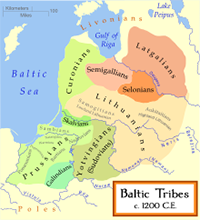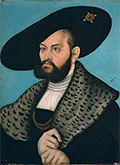Prussia: German Powerhouse for Centuries
Part 1: Power Buildup Prussia was a powerful state and kingdom in what is now Germany, dominating the landscape of Central Europe for centuries. 
The land that was Prussia arose out of a collection of medieval Baltic tribes who were well established by the time the Teutonic Knights arrived in the early 13th Century. The Teutonic Knights, a military order, threw in their lot with Duke Konrad of Mosavia and successors and eventually conquered the Prussian tribes. In the mid-15th Century, a significant number of nobles in more than a dozen cities broke away from the Knights' influence and formed the Prussian Confederation, allying themselves with Poland. This led to the Thirteen Years' War, which ended in 1466 with the defeat of the Knights and the incorporation of the breakaway lands into the Kingdom of Poland. 
A couple of generations later came another conflict, the Polish-Teutonic War. A 1525 treaty ended that war and resulted in the creation of the title Duke of Prussia, first claimed by Albert I (right), a former Grand Master of the Teutonic Knights. Several years later, Albert married Anna Marie of Brunswick-Lüneburg, whose lineage was to the House of Hohenzollern and to the Margraviate of Brandenburg, powerful prince-electors in the Holy Roman Empire for more than a century. Thus came about the melding of Brandenburg and Prussia. Albert and Anna Marie had a son, Albert Frederick, who succeeded his father in 1568 and died in 1618, giving way with the ruling of the Duchy of Prussia to the Electors of Brandenburg. The duchy continued to be under Polish jurisdiction for a few more decades. The Thirty Years War proved problematic for Brandenburg Prussia because the Elector when the war began, George William, didn't want to take sides. He eventually agreed to let Swedish troops into Brandenburg in order to fight against Catholic armies; the result was the ravaging of Brandenburg lands. A new elector, Frederick William, took over in 1640 and represented his lands in the negotiations that ended the war, bringing about the Peace of Westphalia. One result of that series of agreements was the territorial growth of Brandenburg Prussia. Another was the creation of a standing army that Frederick William and his successors to put good use should political disagreements arise. That standing army got involved in other conflicts in the next several years, allying with Sweden in the Second Northern War in the 1650s and with (and then against) the Dutch Republic in the Franco-Dutch War in the 1670s. In 1686, Frederick William concluded an alliance with Holy Roman Emperor Leopold I. Continuing that alliance was Frederick William's son and successor, Frederick III. In 1701, this elector declared himself King in Prussia (after getting the emperor's permission), dropping Brandenburg from the name of the entity. In the early 18th Century, the new kingdom of Prussia fought in both the Great Northern War and the War of the Spanish Succession, in the former fighting with Russia against Sweden and in the latter fighting against France and Spain. Ruling Prussia during this time was the son of Frederick I, Frederick William, who professionalized the standing army, building it into a vaunted fighting force. He also established an absolute monarchy and was referred to by many as the Great Elector. In 1740, decades after both of those wars had concluded, Frederick William died; succeeding him was Frederick II, who came to be known as Frederick the Great. His ambitions led Prussia into a pair of largely localized Silesian Wars that evolved into the much wider-ranging War of the Austrian Succession. The Holy Roman Empire won that conflict, but Frederick continued to enhance his kingdom and its army. In 1772, Frederick was instrumental in the First Partition of Poland. Next page > Continuum of Success > Page 1, 2 |
|
Social Studies for Kids
copyright 2002–2026
David White




